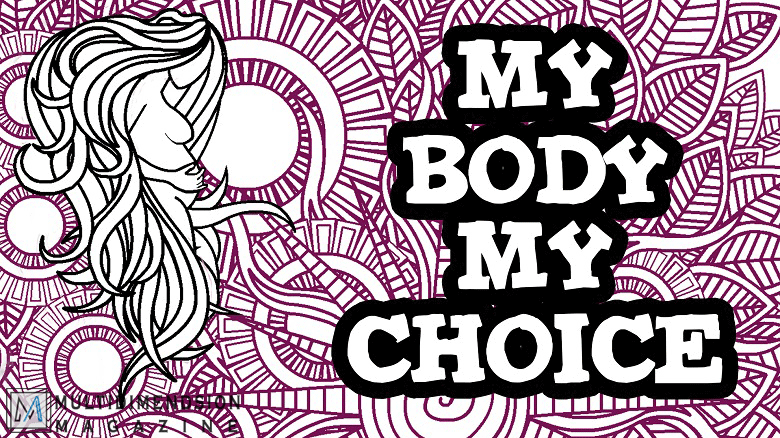Deboshruti Roychowdhury
Illustration: Sagar Mondal
‘If you don’t trust me with a choice, how can you trust me with a child?’ – Unknown
The Republic of Ireland has voted overwhelmingly to overturn the abortion ban by 66.4% to 33.6% just a month back.
A referendum held in May resulted in a landslide win for the repeal side.
Previously, abortion in Ireland was only allowed when a woman’s life was at risk, but not in cases of rape, incest or fatal foetal abnormality.
But why was abortion such a big issue for the Catholic Ireland which had voted on abortion five times since 1983, until the May 2018 one?
Catholicism has still been the biggest religion in Ireland in spite of falling mass attendance and abortion a huge religious issue because the Sixth Commandment (or the Fifth by Catholic count) says, “Thou shalt not kill.” For evangelical Christians, in general, abortion is murder.
But is abortion murder? Most people think not.
Evangelicals may argue that most people in Germany thought it was all right to kill Jews. But the parallel is not valid. Slaughtering Jews was slaughtering people. But killing foetuses is not the same as killing people. I shall explain why.
St. Thomas Aquinas (1225-1274), one of the foremost proponent of natural theology took help from Aristotle in explaining the different kinds of animation in order to explain the core of human existence — the nutritive (vegetable) soul, the sensing (animal) soul, and the intellectual soul. Some people used Aristotle to say that humans therefore have three souls. Others came up with the view that the intellectual soul is created by human semen.
Aquinas denied both positions. He said that a material cause (semen) cannot cause a spiritual product. The intellectual soul or the awareness of the personhood is directly created by God ‘at the end of human generation.’ This intellectual soul supersedes what had paved the way for it (nutritive and sensory animation). So Aquinas denied that personhood ascended at fertilization by the semen. To him, God directly infuses the soul on the accomplishment of human formation.
Going back to where it all started from- that the debate over abortion is a religious issue and the pro-life advocates act-out of religious conviction. Fortunately, it is not a theological matter at all. There is no theological basis for protecting or condemning abortion. Even popes had to accept that the question of abortion is a matter of natural law, to be decided by natural reason. If we are to decide the matter of abortion by natural law, that means we must turn to logic and science. But that is definitely not something what evangelicals are comfortable with, since the relevant experts here are philosophers, neurobiologists, embryologists. Evangelicals want to discount them because most give answers they do not want to hear.
So evangelicals take shortcuts. They bet heavily on being pro-life. But one cannot be arbitrarily pro-life.
If one claimed, that all life warranted moral respect, then plants have rights, and it might turn out that we would have almost nothing to eat. And if one were consistently pro-life, one would have to show moral respect for insects, tissue excised during a surgery, cancer cells, and eggplant, and so on.
Opponents of abortion say that they are protecting only human life. It is true that the fetus is human life. But so is the semen before it fertilizes; so is the ovum before it is fertilized. They are both human products, and both are living things. But not even evangelicals say that the destruction of one or the other would be murder.
The universal mandate to preserve ‘human life’ makes no sense either. Don’t we cut our hair when it grows? But hair is human life- it is living. Then? Is that same as aborting human life? An evangelical might respond that our hair does not have the potential to become a person. True. But semen has the possibility of becoming a person, even then we do not preserve every bit of semen that is ejected at the moment of sexual climax but never fertilized an egg, do we?
The question is not whether the fetus is human life but whether it is a human person, and when it becomes one. Is it when it is capable of thought, of speech, of identifying itself as a person, or of assuming the tasks of a person? Is it when it has an operative brain? Aquinas said that the fetus did not become a person until God instilled the intellectual soul. Science says, a functioning brain is not present in the fetus until the end of the sixth month at the earliest.
Whether through coincidence or through some sort of causal connection, it seems that the onset of a functioning central nervous system with an operative cerebral cortex and the commencement of sustainability occur around the same time- the end of the second trimester of pregnancy, a time by which 99% of all abortions have already happened.
The opponents of abortion may like to show sonograms of the fetus responding to stimuli. But all living cells have electric and automatic reactions. Aquinas, following Aristotle, called the early stage of fetal development vegetative life. The fetus has a face long before it has a brain. It has animation before it has a command centre to be aware of its movements or to experience any reaction as pain.
At this stage of the argument this is fair to accept that these are challenging matters, on which competent people differ and disagree. It is not enough to say that whatever the woman wants should be accepted. But given these uncertainties, who is to make the individual decision to have an abortion? Religious leaders? They have no special authority in the matter, which is not subject to theological norms or guidance. The state? Its authority is given by the people it represents, and the people are divided on this. Doctors? They too differ. That leaves us with the woman who is the one closest to the decision and most directly affected by it.
And how does a woman capable of taking such a decision benefit the larger society?
In Katha Pollitt’s new book, Pro: Reclaiming Abortion Rights (2015), she argues that, as much as abortion is a private medical decision, it’s also a necessary public good. “We should accept that it’s good for everyone if women only have the children they want and can raise well,” she writes. She continues:
Society benefits when women can commit to education and work and dreams without having at the back of their mind that maybe it’s all provisional, because at any moment an accidental pregnancy could derail them for life.
Pollitt mentions, for example, that between 1970 and 1990, “the Pill accounted for nearly three quarters of the increase in the number of women who became doctors and lawyers.”
The right to abortion contribute to the same phenomenon: it allowed women an unmatched and unprecedented amount of control over their lives and futures.
The ability to device if and when we parent, regulates how we contribute and participate in a society. Yes, women can be mothers while being lawyers or politicians or students. But those who chose to become parents after the extensive availability of birth control were essentially capable of deciding when and how to have children.
The hard part about arguing that abortion is essential and necessary for women’s equality, of course, is that there are still too many people who don’t see women’s pursuit of contentment as an inviolable right. To them it’s more important for women to be mothers than go to college; to have a job that pays well or to chase a career path they love are still negligible and insignificant realities to these people compared to accepting a woman’s biological role as forever pregnant. To them, a woman’s ability to breed outperforms any other contribution to society that she could possibly make.
The struggle against that mind-set will continue!




